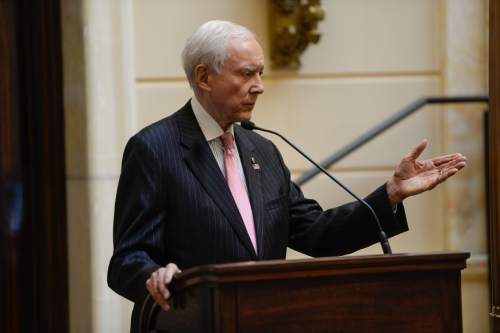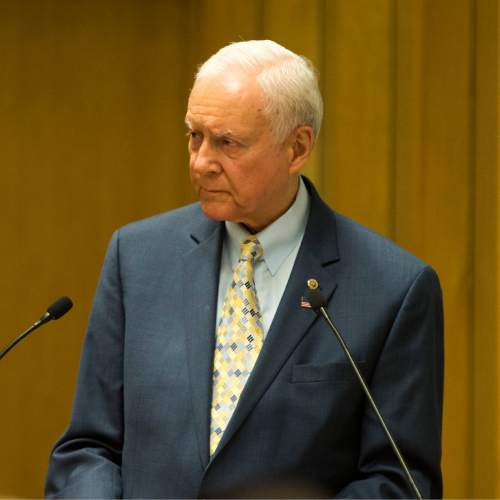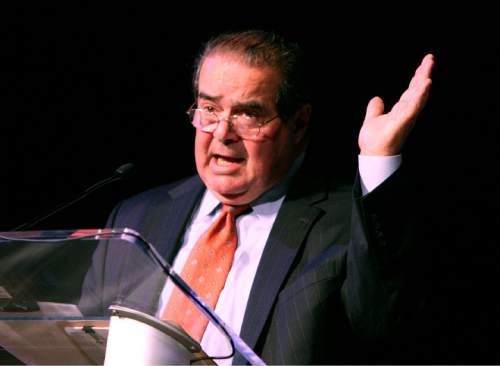This is an archived article that was published on sltrib.com in 2016, and information in the article may be outdated. It is provided only for personal research purposes and may not be reprinted.
Washington • In summer 2004, when President George W. Bush was locked in a close race with Sen. John Kerry, the chairman of the Senate Judiciary Committee scheduled hearings on several court appointees over the objections of Democrats concerned about pushing through more Bush-nominated judges on the eve of an election.
That chairman, Sen. Orrin Hatch, said it was duty of the Senate to confirm judges.
"The fact is we have to try to keep moving judges as much as we can because it's the country that's concerned, not politics," Hatch, a Utah Republican, said at the time.
Four years later, again in the midst of a presidential election, Hatch lambasted Democrats — who held a majority in the Senate — for holding up nominees of Bush, then a lame duck.
"We are failing to do our duty," Hatch said on the Senate floor.
"The majority has already virtually shut down the judicial-confirmation process," he said. "The Senate has not always operated this way. The majority is simply refusing to do what the American people sent us here to do because, I guess, simply, they can. That may be the reason, but it is certainly no excuse."
Nearly eight years later, against the backdrop of a raucous White House race, Hatch now says the Senate must refuse to hold hearings on any nomination by President Barack Obama to replace the late Associate Justice Antonin Scalia. The pick, he says, should come from the next president.
Hatch says the circumstances now beg for waiting.
"This is a much more different time," Hatch said Wednesday in an interview. "Even if people are right in arguing that there's no precise precedent for waiting until after the election to fill a Supreme Court seat, what that tells me is that this is an unprecedented situation, and if it really is an unprecedented situation, the best course of action is to wait until the voters have a chance to make their voices heard in November."
The current race for the Oval Office is the "most contentious presidential election" he's seen in his 40 years in the Senate, Hatch says, and delaying a nomination serves the best interests of the country.
"My position is more than ideology or politics — it's about protecting the integrity of the court and removing it from the toxic political arena of the presidential election," Hatch added. "I can't see any good coming from any nomination at this time. The president has an absolute right to submit a name for the Supreme Court. The Senate has an absolute right not to confirm or not to even hold hearings."
Hatch's position against any confirmation hearings for an Obama nominee appears to be widely shared among his GOP colleagues, including Majority Leader Mitch McConnell of Kentucky and current Judiciary Chairman Chuck Grassley of Iowa.
Grassley had said initially there would be no hearings — period — but backed off a bit during a call with Iowa reporters this week, suggesting it wasn't a hard no.
"I would wait until the nominee is [named] before I would make any decisions," Grassley said, according to Radio Iowa. "In other words, take it a step at a time."
Hatch, the GOP's most senior member and the Senate president pro tempore, did offer Democrats a gem Wednesday when he told CNN's Wolf Blitzer that he would oppose using the procedural tactic of a filibuster to block a Supreme Court nominee, a position Hatch has long held.
"I don't think we should filibuster Supreme Court nominees or any judge nominees," Hatch told CNN, a comment that the White House's principal deputy press secretary, Eric Schultz, tweeted out.
Hatch earlier didn't even think it would get to that point.
"If you're not going to have a vote on the person," he said, "you don't need to hold hearings."
Both Hatch and his Utah GOP colleague, Sen. Mike Lee, sit on the Judiciary Committee, which is charged with vetting Supreme Court nominees.
Lee, a former appeals court clerk to Justice Samuel Alito, says the court is well-equipped to handle the caseload with eight justices, and that happens on occasion anyway when one justice has to recuse himself or herself because of a conflict. Delaying a confirmation makes sense because of the political climate and the proximity of an election.
"I don't think it should be terribly surprising that Senate Republicans aren't inclined to confirm anyone in an election year," Lee said in an interview this week.
"The president is free to nominate," Lee added, "but the Senate is also free to work its will."
Lee said it has been nearly 80 years since there was a vacancy to fill on the high court in a presidential election year, though there is a more recent example that is similar.
Then-President Ronald Reagan nominated Anthony Kennedy to fill a seat vacated by retiring Justice Lewis Powell on Nov. 30, 1987, the year before Reagan was term-limited out of office. The Democratic-controlled Senate confirmed Kennedy on Feb. 3, 1988, on a vote of 97-0.
Hatch voted for Kennedy.







